
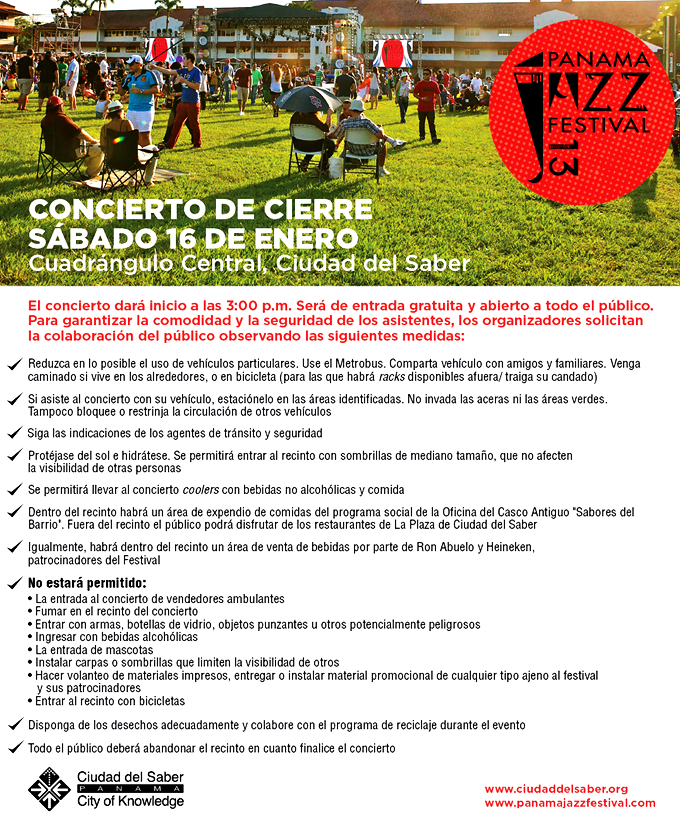


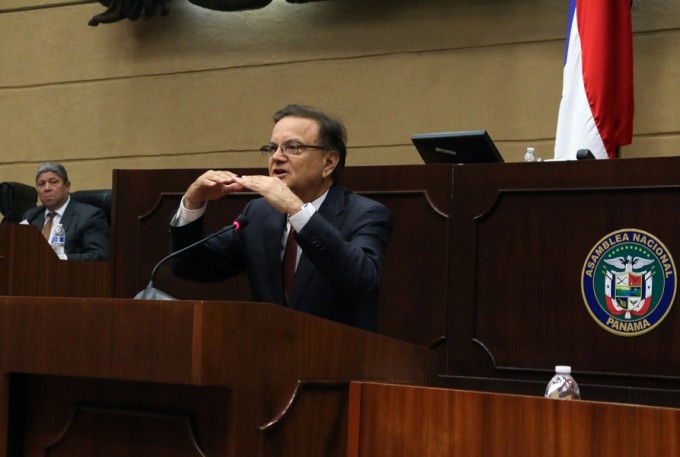
Sólo si algo inesperado ocurriera, el proyecto de ampliación del Canal de Panamá será recordado como otro gran “escándalo” que involucra al gobierno, la elite empresarial panameña e intereses extranjeros. El pueblo panameño y las futuras generaciones serán los grandes perjudicados. La propuesta de ampliación del Canal –construcción de un tercer juego de esclusas con mayor capacidad que las existentes– fue presentada por el presidente Martín Torrijos en 2006. La Autoridad del Canal de Panamá (ACP), celebro del proyecto, aseguró que el Canal ampliado le rendiría al país enormes beneficios.
Han pasado casi 10 años y el país está todavía enfrascada en un debate sobre las bondades del proyecto presentado. Por un lado, todos los defectos previstos están saliendo a flote. Por el otro, la corrupción de las empresas involucradas e intereses especulativos locales, que no fue un factor analizado, ha aparecido en el corazón del proyecto.
En 2006 el Frente Panamá Soberana (FPS) realizó un esfuerzo extraordinario para analizar la propuesta de la ACP y del presidente Martín Torrijos. El resultado del estudio que efectuó arrojó como resultado serias deficiencias e inconsistencias en la propuesta. Incluso, el FPS recomendó que se rechazara ese proyecto de ampliación del Canal de Panamá. No fuimos los únicos. Desde diferentes sectores de la sociedad panameña surgieron dudas sobre la propuesta.
El FPS no se opuso –ni si opone, en la actualidad– a ampliar la capacidad de tránsitos por el Canal. Se opuso, en aquel momento, a la propuesta que presentó el gobierno de Martín Torrijos, sustentado por la ACP. El FPS presentó sus razones en foros, documentos y en los medios de comunicación. La principal razón era –y sigue siendo– que el proyecto de ampliación presentado por el gobierno y la ACP era ajena a los intereses de Panamá que como país tiene que integrar el Canal a un plan de desarrollo nacional. Igualmente, se demostró –hace casi una década- que la propuesta de ampliación sólo beneficiaría a las grandes empresas trasnacionales de transporte marítimo que tienen un monopolio a escala mundial sobre esta actividad.
Desde el punto de vista ambiental y de ingeniería, la propuesta de ampliación tenía inconsistencias que ponen en peligro la seguridad del mismo proyecto. La ampliación del Canal necesita nuevas fuentes de agua que no fueron incorporados al documento aprobado. Hay indicios, sin embargo, que la ACP y el gobierno sabían que el proyecto de ampliación necesitaría más agua y no fue incluida por razones políticas.
A su vez, aún no hay seguridad alguna que el proyecto presentado para construir el tercer juego de esclusas no contaminará las aguas de los ríos y lagos que alimenta el complejo del Canal. El FPS denunció en forma oportuna la dificultad que representa introducir los barcos pos-Panamax a las nuevas esclusas mediante el uso de los remolcadores.
Los panameños nos enfrentamos, en la actualidad, que todas las advertencias y dudas que generaba el proyecto de ampliación del Canal palidecen frente a las maniobras financieras de las empresas contratadas por la ACP para construir el tercer juego de esclusas. La deficiente administración – para no decir colusión – de la ACP le ha permitido a un consorcio europeo abusar del fisco panameño y hacer demandas desmedidas de sus recursos en abierto desafío de las leyes y contratos celebrados entre las partes. La construcción del tercer juego de esclusas fue presupuestado en 2007 en 3.2 mil millones de dólares. A principios de 2016, con el 94 por ciento de la obra completada, el consorcio europeo ha recibido de la ACP casi 4 mil millones de dólares. Además, está exigiendo otros 2.5 mil millones de dólares en supuestos “sobrecostos”.
Las demandas del consorcio europeo, que cuenta con el apoyo de varios gobiernos de ese continente, son inadmisibles y deben ser rechazadas por el pueblo y el gobierno panameños. Las fallas de la ACP deben ser objeto de un análisis profundo por las fuerzas sociales del país e, igualmente, por parte del gobierno. Pero no sólo corresponde oponernos a estas demandas. Es necesario redefinir el proyecto de ampliación del Canal y presentar una propuesta que ponga el desarrollo del país como objetivo central de esta inversión enorme que se ha realizado.
Las generaciones que lucharon y dieron sus vidas por rescatar la soberanía del país –1947, 1959 y 1964– no lo hicieron para que esta generación de 2016 lo entregara a una pequeña elite de malos panameños y sus socios extranjeros. Todos los recursos del Canal de Panamá tienen que estar al servicio del engrandecimiento del país y de su pueblo.
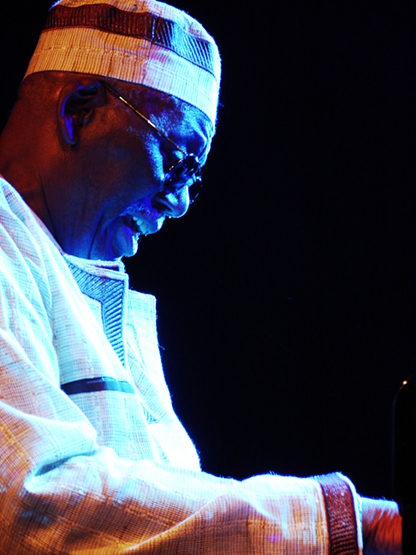
He could be a Panamanian citizen if he wanted to be, and Jamaica would have an even greater claim. But Randy Weston, a lifelong Brooklyn resident and US Army veteran, emphasizes his African identity.
On his mother’s side Weston, who was born in Brooklyn in 1926, is of Jamaican extraction. His father’s people also trace roots back to Jamaica, but his paternal grandmother came from Jamaica to run a bakery during canal construction times, giving birth to his father in Panama. Under Panamanian law the child of a parent who was born in Panama can be Panamanian if she or he wants to be. But Frank Edward Weston, the immigrant businessman raising a family in Brooklyn’s Bedford-Stuyvesant neighborhood, chose things to embrace and things to leave behind. He spoke Spanish as well as English, but “that generation wanted to adapt to America” and he raised his son Randy speaking English in the home. A barber and restaurateur, the elder Weston directed his tall son away from the basketball court and into piano lessons. Across the river in Manhattan the social, cultural and political flowering known as the Harlem Renaissance was in full bloom as Randy was growing up and his dad took him to places in Harlem and the Village to expose him to the likes of Duke Ellington, Eubie Blake and New York’s calypso scene. The elder Weston chose carefully among the educational opportunities available to black people in Brooklyn at the time, sending Randy to Boys High School in Bedford-Stuyvesant and choosing a piano teacher who would let him get beyond the standard classical canon.
What other sorts of values were coming from the Weston home? Randy’s father was not a movement person, but “he loved Marcus Garvey” and passed on that Pan-Africanist leader’s Afrocentric, self-reliant, independent set of values to his son. Later when, at a certain postwar moment in jazz circles, “everyone wanted to go to Europe,” Randy Weston had heard of Europe from his dad and was not terribly interested — the attraction was to Africa. “We grew up with imperialism — everything was about taking advantage of the African.”
As the clouds of world war gathered in Europe and Asia, a teenage Randy Weston growing up in Bed Stuy hung out with drummer Max Roach, who lived in the same neighborhood, and was deeply influenced by the music of Thelonious Monk and Coleman Hawkins. On other cultural fronts, what’s an Afrocentric upbringing without an appreciation for fiery food? Starting about age nine, his father introduced Randy to the acquired taste of hot peppers. “He cooked everything — he made ice cream, beer, wine and baccalao, and cooked pies.”
Boyhood ended with a call to arms at age 18. That took Randy Weston away from Brooklyn and North America — to Okinawa and a year’s exposure to that bit of non-Western civilization.
Back in Brooklyn after the war, Randy took over management of one of his dad’s restaurants, a place called Trios. “That’s where all the music was.” Trios became known as quite the hangout for the bebop scene. Added to Trios was the renewed old friendship with Max Roach, also back in the neighborhood. Weston met Charlie Parker and Dizzy Gillespie at Roach’s house.
“Brooklyn was very family,” Weston explained. Jazz was all over, but a musician from Kansas City or Detroit had to make a certain pilgrimage to get recognition in the business. “New York was the place. Everyone had to come to New York to prove themselves.” And in that concentrated scene Weston proved and improved himself, acquiring a reputation of his own, working with some of the top people and making music outside of overly formatted boxes.
The time came for Randy Weston to take his show on the road — to Africa. In 1960, in collaboration with arranger Melba Liston and with narration by poet and writer Langston Hughes, Weston recorded Uhuru Afrika. In that period he also was noticed for a cover of Nigerian Bobby Benson’s Niger Mambo. The call was getting louder on both ends. A 1963 trip to Nigeria was followed a few years later by a 14-country tour across northern and western Africa, under the auspices of the US State Department. In places like Senegal, Niger, Mali, Sierra Leone, Cameroon, Gabon, Algeria and Egypt he met the first leaders of newly independent African nations. The last stop on the tour was in Morocco, where he received an invitation to come back.
And back to Africa Weston did come, playing, learning and running a Tangiers nightclub called African Rhythms. He learned bits of African languages, collaborated with his son and musicians from all over and took a special interest in the music of the Gnawa, originally a sub-Saharan people brought to Morocco as slaves and now a crucial force in Moroccan music and culture.
After about five years living in Africa and en route back to Brooklyn, Weston did manage to put in his appearance on the European scene, which by then was broadening its horizons to include an appreciation of sounds coming directly out of the continent to the south. He has been back to Europe a few times, including a special session playing for Queen Elizabeth II.
So to what is Randy Weston listening now? Don’t hold your breath waiting for the 89-year-old to release a hip hop album. He doesn’t listen to much new stuff, not even the more recent sounds coming out of Africa. “I collect traditional music, the oldest music I can find,” he said. He’s picking up on new things in the old stuff he visits and revisits. “I’m still listening to Louis [Armstrong]” — and noticing influences and strokes of creative genius that hadn’t been noticed before.
One of the reasons why Weston left for Africa in the 1960s and 70s was that the record industry was concentrating into narrow commercially oriented formats under the leadership of people who knew much about money and little about art. Today’s music business? “Forget it.” Worse yet, “the media ignore art.” But it’s not as if today’s music entirely escapes Weston’s attention. “The African pulse is there wherever you find us. Take the African culture out of the USA and you would be left with nothing. The whole concept of music comes from Africa.”
Well of course. Humanity originally comes from Africa. People and their brains with “wired in” language. People whose damaged brains can lose the power of speech, but can often be healed with music therapy. Weston cites the example of his late collaborator and arranger, trombonist Melba Liston. She suffered a massive stroke that left her paralyzed on her right side, ending her days of playing the trombone. But she fought back to rewire her brain circuitry, learned to type into a computer with her left hand and had more days of composing and arranging in her before another series of strokes ended her life.
And how does a man stay lucid as his 90th birthday approaches? The energy level isn’t there for Weston to be touring anymore, but he says he will never retire. Don’t recent medical studies show that being bilingual delays the onset of Alzheimer’s? And isn’t music a language, or a set of languages?
That question has the concept backwards, according to Randy Weston. “Music is before language — language has to have music in it to be properly spoken.”
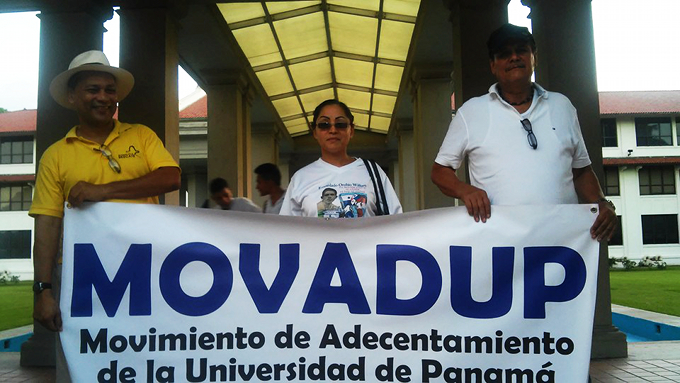
El Comité de Coordinación Nacional del MOVADUP, con respecto a la contienda electoral universitaria que se avecina, ha decidido adoptar una postura proactiva y mantener una posición supraelectoral para promover el conocimiento y el interés de todo el pueblo panameño con respecto a los asuntos universitarios en general y a los de la Universidad de Panamá en particular, a lo cual no escapa el escrutinio público hacia todos aquellos que tengan aspiración de ocupar cargos de elección en la Casa de Méndez Pereira.
El MOVADUP considera que la Universidad de Panamá le pertenece al pueblo, e intenta modestamente ser un vehículo crítico a través del cual cualesquiera aspirantes a cargos de elección universitarios respondan a sus inquietudes y presenten AL PAÍS ENTERO sus programas. El MOVADUP sigue indeclinablemente el espíritu y la letra de sus documentos fundacionales, los cuales consignan nuestra voluntad inquebrantable de que los procesos universitarios superen el embozamiento del claustro y salgan a la luz de la comunidad, para ser escrutados y perfeccionados por la ciudadanía, única y legítima soberana y dueña de la Universidad Pública.
Por lo tanto, además de que es conocida nuestra posición en la lucha contra la corrupción y los abusos en la Universidad de Panamá, habida cuenta de que la actual administración universitaria se ha descalificado al parcializarse públicamente al llamar “mala” y “basura” a la disidencia y a la oposición, y en virtud de que las organizaciones políticas de los aspirantes naturalmente están ocupadas en la conquista de votos, el MOVADUP considera que es su deber universitario y patriótico crear espacios para promover el escrutinio de los aspirantes, de sus planes y programas de gestión, de cómo será confrontado su proyecto con lo existente en la actualidad y qué proyecciones tendrán hacia el país. Ha llegado la hora de elevar la categoría de las elecciones universitarias y darles el carácter de interés nacional activo y beligerante que tanto merece y necesita, único modo de garantizar su buen gobierno y la evitación de los manejos erróneos de los que ha sido víctima hasta ahora.
El MOVADUP, por consiguiente, invita cordialmente a todos los ciudadanos , ya sea de dentro del claustro universitario como de fuera de él, incluyendo a los distinguidos aspirantes a puestos de elección universitarios, a las mesas redondas que con el tema: El perfil del candidato universitario, se han organizado y en las cuales todos los asistentes tendrán oportunidad democrática de participar.
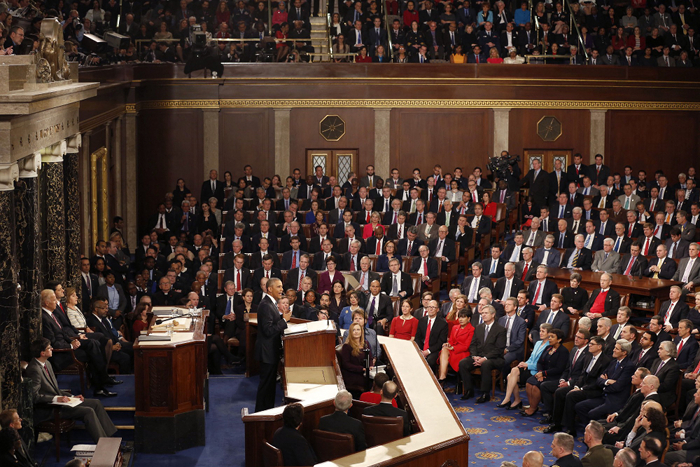
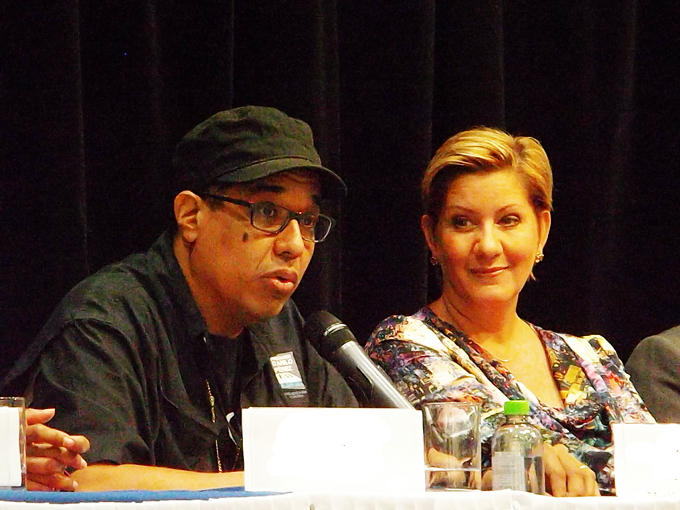
If man is a political animal, is Danilo Pérez trying to domesticate the wild women of Panamanian politics and deprive the nation’s more lowbrow and almost invariably male politics junkies who were looking forward to full-contact kung fu in the National Assembly? He did get some laughs at the Panama Jazz Festival opening press conference with his call for “music therapy for the legislators.” The first lady seemed to enjoy that, but in her own statements kept the politics down to calling for increased support for such cultural events and sharing out thanks among God and the people working to put on the festival.
Pérez, the renowned pianist, composer and educator, may be the festival’s founder and artistic director but he was in a mood to share. “This is Panama’s festival, it’s not Danilo Pérez´s festival.” He spoke of what he’s trying to do not as this wonderful show — which it is — but as an educational mission. The successful study of music, he noted, promotes “responsibility, discipline and teamwork.” The educational side of the jazz festival, he claims, gives young people living in difficult circumstances opportunities that those without affluent parents generally don’t get, pointing to Colon violinist, arranger and band leader Joshue Ashby as an example of that.
Panama City’s vice mayor, Raisa Banfield, concurred. The development of young talent at the workshops and auditions, she said, is the most important thing going on this week at the City of Knowledge.
It’s not strictly about jazz, either. There has always been a classical element to the jazz festivals and this year’s festival includes Puerto Rican singer Danny Rivera, who performs many genres of music, the gospel scene’s Kevin Harris and local notables Luci and the Soul Brokers. (That latter band’s female lead vocalist is named Mayra Hurley — don’t tell The Church Lady.) Asked about other genres at the festival, Pérez quoted Herbie Hancock: “Music is the expression of humanity,” added that “Jazz is an expression of freedom” and opined that jazz maintains its vitality by drawing upon folklore, which comes in almost infinite varieties.
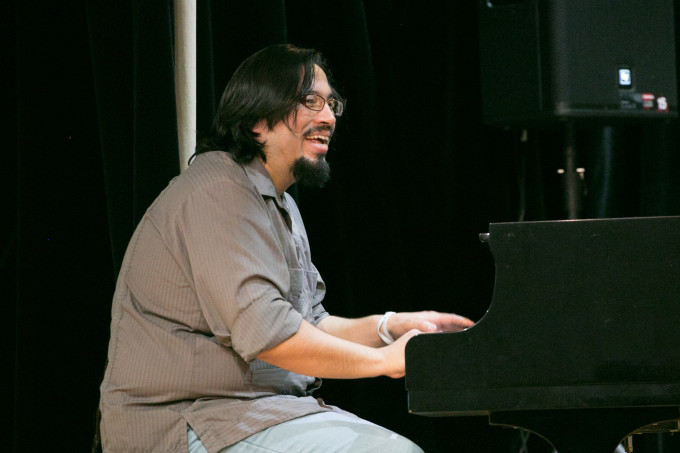
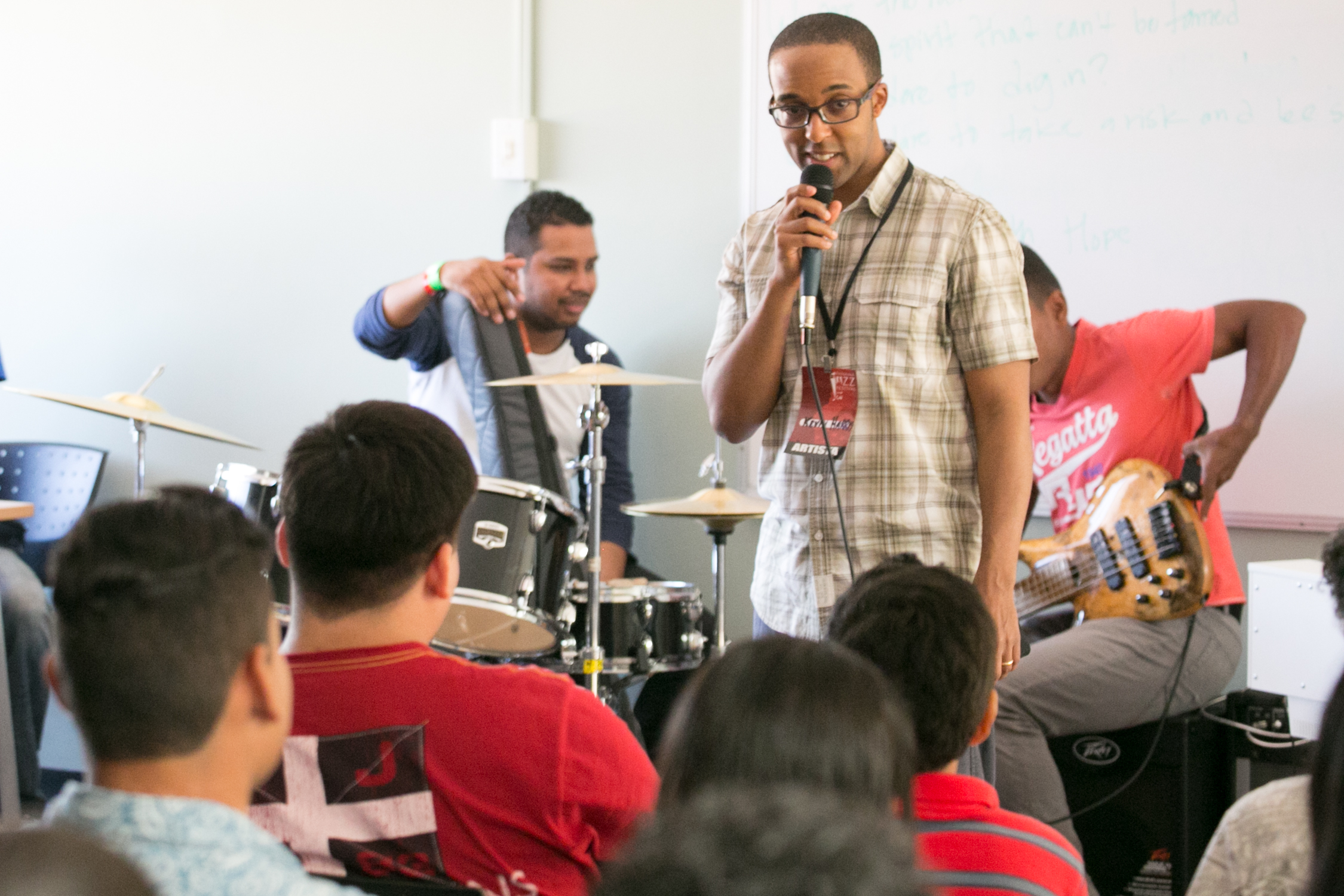
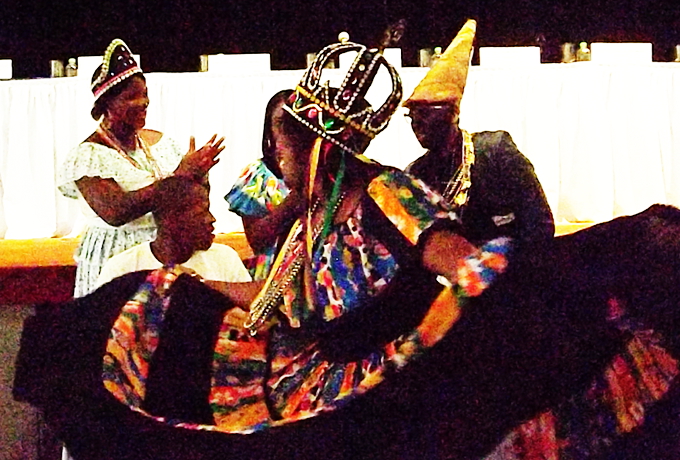
Check out host Fusion’s website coverage:
Hillary on extremists with guns
Bernie on living in public housing
Martin on Democrats as the party of diversity
Des Moines Register: The best, worst and silliness at Iowa Democrats’ forum
The New York Times: Hillary races to close enthusiasm gap with Sanders
The Guardian: Clinton and Sanders go on the attack
CNN: Sanders talks about sex, Clinton about deportations
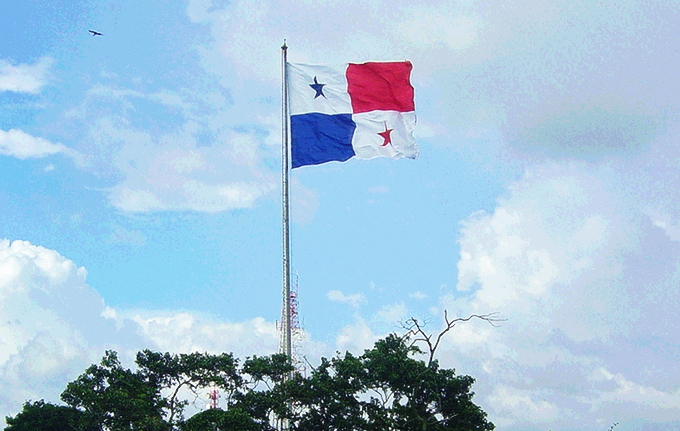
In another place, at a different time, a martyr for a different aspect of what’s really a universal human cause, South African Black Consciousness Movement leader Steve Biko, observed that “The most potent weapon of the oppressor is the mind of the oppressed.” So it was then and there, so it was on The Day of the Martyrs and so it is now, in Panama and elsewhere.
On January 9, 1964 the Panamanian mind didn’t function the way it was “supposed to.” Resignation in the face of nothing ever changing, ignoring banal insults in order to avoid making things worse, the narrow concern for self and family — for a moment these things dissolved under a tidal wave of fury, and things would never be the same again. That fury was not a perfect storm but the accumulated actions of imperfect people. Most of the people who were hurt on both sides didn’t deserve to be hurt, but a point was made.
Usually such fury can be heard coming, but usually the sounds and signs are ignored until Hell has broken loose. In 1947 and 1958 the alarm was sounded in some unmistakable ways. In a ceaseless procession of movements, statements, gestures and resolutions from the end of World War II to the Day of the Martyrs, Panamanians of all social classes had been saying that they were fed up. If some of those whose lives were profoundly changed never knew what hit them, it’s because they weren’t paying attention, by and large because they were taught not to pay attention.
The past should illuminate our present and provide a set of warnings as we move into the future. Mostly, however, it gets trivialized, mythologized and spun for partisan advantage. Those who object to the distortions tend to get their motives and their credentials as human beings questioned by those who would privatize the nation’s history. But the momentous acts of individuals and groups don’t belong to any party, faction, social segment or would-be leader. Some person or group might gain control over what the history books are allowed to say, but they don’t own history.
The Day of the Martyrs was then. The Canal Zone is over. Panama lives on, its fate in the hands of new generations. Today’s Panamanians face some new situations, but the basic questions that all ought to ask are the perennial ones. Which insults and injustices will you tolerate, and for how long? For what are you willing to die? Much harder: For what are you willing to work and to dedicate your life?
Yadda yadda yadda — nothing ever changes. And if the head of the Colegio de Abogados, Panama’s principal bar association, files criminal charges for fraud in the Panama Canal expansion, many will be accustomed to tuning that stuff out, many because they have been advised to do so. It’s a good way to miss the sound before the fury of those who are oppressed.
Panama is oppressed by a parasitic, amoral and arrogant political caste that does everything it can to avoid accountability and every five years appeals to the baser instincts in the pubic mind to get its grip on power renewed. Panama is oppressed by a predatory and generally incompetent domestic social elite that has convinced many Panamanians that its own genealogy and its highly fictionalized history are the only subjects worth knowing, to the exclusion of the skills and wisdom that society’s individual members need to amount to a self-reliant, prosperous and well-ordered nation. These political and economic elites have put us at the mercy of a multinational corporate oligarchy that stifles our development, cheats us on a daily basis and has too many of us believing that it is too big to fail and thus that there is no viable alternative to putting up with its abuses.
Are we to explode in a hot fury that leaves us with a new generation of martyrs — to add to those already blinded in Changuinola, shot down at the edges of the comarca, burned alive in Tocumen, killed by anti-union company goons and otherwise fallen at the hands of Panama’s now-reigning oppressors? Are we to relentlessly drive those now in control from power and strip them of prestige in an irresistible cold fury that forever changes who and what Panamanians are? Only when we, like the martyrs of 1964, stop letting our minds be used as weapons against us.
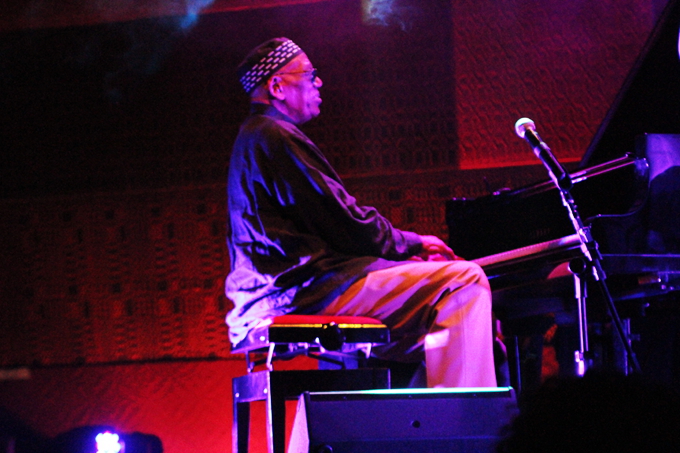
Bonnie Raitt – Storm Warning
https://youtu.be/qAGXPKNPK_M
Zoé – Sombras
https://youtu.be/K3BOW3Y0hyQ
Lee Oskar – Before the Rain
https://youtu.be/9g6gfIbzQAs
The Doors – Riders on the Storm
https://youtu.be/k9o78-f2mIM
Alejandro Sanz & The Corrs – Un Noche
https://youtu.be/u2gcjLaBLvA
Danny Rivera – Madrigal
https://youtu.be/Dl3REvj2xf4
John Coltrane – A Love Supreme
https://youtu.be/_qt435yF2Qg
Randy Weston & Billy Harper – Blues To Senegal
https://youtu.be/DDkjkqPOb_4
Youssou Ndour – Yaakar
https://youtu.be/HzsQfjnOfro
Joss Stone – The Answer
https://youtu.be/Te50aSDIByM
Prince Royce – Handcuffs
https://youtu.be/944GwSiPVH4
Hello Seahorse! – Me He Convertido
https://youtu.be/GWQd-xzfXL4
Carlos Garnett – Mystery of Ages
https://youtu.be/v2hbLGEryRA
Janis Joplin – Summertime
https://youtu.be/guKoNCQFAFk
Airto & Flora Purim – Live In São Paulo 1988
https://youtu.be/wY7gRdx7Ctg
AFP, Panama canal expansion to be complete ‘around May’
Ship & Bunker, ACP and GUPC trade shots over delays
ANP, Panamá cierra con modesto crecimiento en carga marítima
The Maritime Executive, Reassessing prospects for the proposed Nicaragua Canal
CNN, Copa among the most punctual airlines
Illinois State University News, Illinois State welcomes Panamá Bilingüe
ANP, Gobierno impulsa mejoramiento genético de ganado
Fruitnet, Chiquita introduces new banana brand
Fresh Plaza, Chiriqui incorporates drones in agriculture
Total Telecom: C&W, Huawei trial G.fast in Panama
LatinOne, Dubai targets Panama and Mexico for investment
CONCACAF, Panama prepares for Cuba in Costa Rica
SoundersFC.com, Torres not rushing his recovery
Cayman Compass, Third indicted CONCACAF chief faces US extradition
Reuters, US judge ties Martinelli to SAP bribe case
InSight Crime, Panama court case highlights challenges of political immunity
El Tiempo, María del Pilar Hurtado quiere que Panamá la indemnice
Newsroom Panama, Homicides down 28% in 2015
La Estrella, La familia Pujol invirtió en Panamá $92 millones
TeleSur, Panama moves to prevent spread of swine flu after migrant dies
EFE, Panamá suma 24 casos de virus zika en mes y medio
Prensa Latina, Death toll rises to 17 due to AH1N1 in Costa Rica
TakePart, Farming frogs can save them from extinction
Science Advances, Entering the sixth mass extinction
Archaeology, Were Panamanian islanders dolphin hunters?
Reporters Without Borders, 110 journalists slain in 2015
Bird, 18 former Guatemalan military officers arrested for crimes against humanity
AP, Egipto arresta a tres administradores de Facebook
The New York Times, Turkey says Erdogan’s Hitler comment ‘distorted’
Amnesty International, Shia cleric among 47 executed by Saudi Arabia in one day
The New York Times, United States curbs psychologists at Guantanamo
The Gleaner, Obama gun controls could help Jamaica
WOLA, Obama limits gun running loopholes
Stiglitz, The Great Malaise continues
Ornstein, The eight causes of Trumpism
Paxton, Is fascism back?
Rosenberg, Is Hillary Clinton a neoconservative hawk?
Moore, Dear Governor Snyder: you have to go to jail
López Alba, El PSOE corre al galope hacia la irrelevancia
Ben-Ami, Exit Latin America’s left
Sader, ¿Cuáles son los límites de la derecha en América Latina?
Arkonada, From the burial of FTAA to the birth of Chinese soft power
Breznitz, TPP is a wonderful idea — for China
Gustafson, Bleak prospects for Latin America under TPP
Prieto & Gammage, Aiding Central America’s “women on the run”
Gandásegui, La corrupción siguió asomando la cabeza en 2015